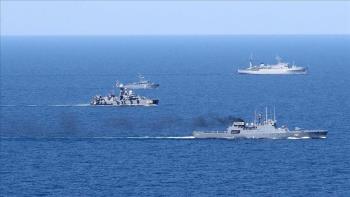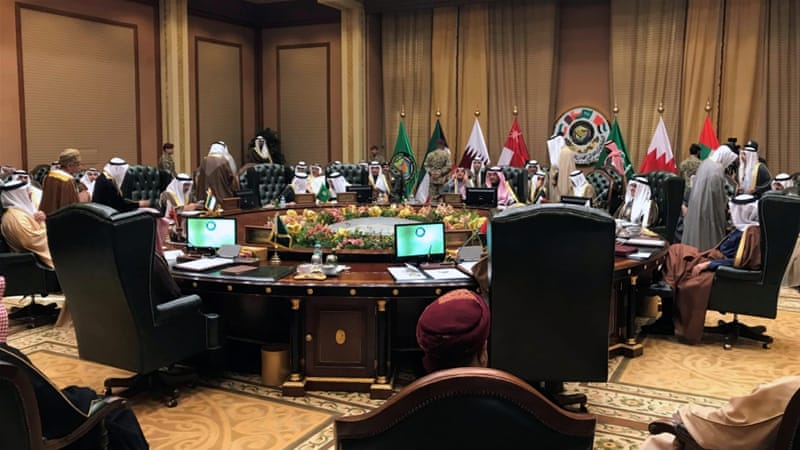Alwaght- The [Persian] Gulf Cooperation Council (PGCC) is facing disintegration following a move by the United Arab Emirates (UAE) and Saudi Arabia to form a new military and trade partnership amid rift with Qatar.
The UAE announced the formation of a new political and military alliance with Saudi Arabia, throwing into doubt the future of the PGCC, the Persian Gulf states’ 36-year-old political and trading bloc.
The development on Tuesday came amid worsening tensions within the PGCC, a political and economic alliance of six countries that includes Qatar, Bahrain, Saudi Arabia, the UAE, Kuwait and Oman.
The regional summit of the six-nation monarchies was cut short and concluded on Tuesday instead of Wednesday, with all the delegates leaving Kuwait after a closed session.
The Kuwait summit takes place exactly six months after three of the member states severed diplomatic and trade ties with Qatar.
Saudi Arabia, UAE form military, political block
According to the statement from the UAE foreign ministry, the new committee "is assigned to cooperate and coordinate between the UAE and Saudi Arabia in all military, political, economic, trade and cultural fields, as well as others, in the interest of the two countries". There has been no confirmation of the new partnership from the Saudis so far. The new Saudi-UAE committee is bound to be seen as an alternative, if not substitute, to the PGCC.
The current Persian Gulf crisis that was triggered in June when Saudi Arabia, Egypt, the UAE and Bahrain cut diplomatic and trade ties with Qatar.
The Saudi-led regimes severed relations with Qatar and imposed a blockade against it, accusing Doha of funding "terrorism". Qatar has vehemently rejected the allegations as "baseless".
On June 22, the group issued a 13-point list of demands, including the shutdown of Al Jazeera TV, limiting ties with Iran, and expelling Turkish troops stationed in the country as a prerequisite to lifting the blockade. Qatar rejected all the demands, denouncing them as attempts to infringe its sovereignty.
The 38th [Persian] Gulf Cooperation Council summit in Kuwait City began amid concerns over how long the crisis has persisted and calls from residents for a speedy resolution.
Calls for unity ignored
The new Saudi-UAE splinter group came despite calls for unity by the PGCC secretary general, Abdullatif al-Zayani.
Opening the summit, the Kuwaiti foreign minister, Sheikh Sabah al-Khalid, insisted PGCC leaders were keen to “meet the challenges of security and stability in response to the aspirations and hopes of the Persian Gulf people for the importance of cohesion”.
While Qatari Emir Sheikh Tamim bin Hamad Al-Thani accepted an invitation to attend the Council’s summit just hours before the talks on Tuesday, the kings of Saudi Arabia and Bahrain as well as the president of the UAE refused to take part in person.
Saudi Foreign Minister Adel al-Jubeir, the Bahraini deputy premier and the Emirati state minister for foreign affairs represented their countries at the summit.
Saudi Influence declining
On Monday, the foreign ministers of Saudi Arabia and Qatar attended round-table talks in their first such encounter since the diplomatic crisis began in June.
Omani Minister of State for Foreign Affairs Yussef bin Alawi sat between them at the meeting which was also attended by the foreign ministers of the UAE, Bahrain and Kuwait.
A number of attempts to heal the rift have so far been made, but all to no avail, including those of US Secretary of State Rex Tillerson, Turkish President Recep Tayyip Erdogan and Kuwaiti Emir Sabah al-Ahmad al-Jaber al-Sabah, whose country has been playing the role of a key mediator since the beginning of the crisis.
Saudi Crown Prince Mohammad bin Salman's intention to punish Qatar has ended up in dismal failure and resulted not only in Saudis losing their power and prestige but the likely disintegration of the [Persian] Gulf Cooperation Council.



























